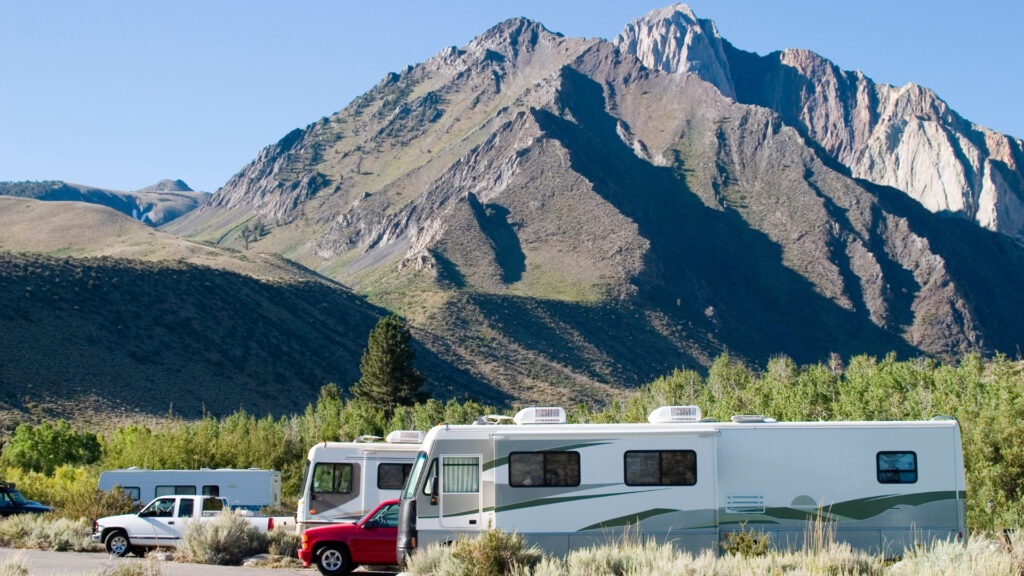Table of Contents Show
All good things must end, including RV life for many travelers. Having an RV exit plan can help you and your loved ones make the transition as smooth as possible.
Many former RVers state that they underestimated how difficult it would be to transition out of RV life. Some have even found that it was more challenging to transition out of RV life than the transition into it.
If you’re planning to throw in the towel for RVing, we have a few things you should keep in mind. Let’s dive in!
What Is an RV Exit Plan?
An RV exit plan is your plan to get off the road as a full-time RVer. It’s thinking through all the logistics of what it will take to return to a sticks and bricks living situation and what life will be like after RVing.
This isn’t a plan you should take lightly. Rushing through your RV exit plan will not be helpful and could set you up for some major complications.
Creating and orchestrating an RV exit plan can take weeks or even months. Make sure you think through the entire process and all the logistics that will go into place.
There are several major things to consider and a bunch of minor issues you’ll need to process.
However, with a solid RV exit plan in place, no matter what happens during your adventures, you’ll be able to make the transition as easy as possible.

Why You Need an RV Exit Plan
It’s highly unlikely that you’ll be RVing forever. Most RVers fall in love with the lifestyle and can never imagine returning to a sticks and bricks home.
However, for one reason or another, things can change very quickly, and traveling the country in an RV might not be possible or ideal.
If you don’t have an exit plan for getting off the road, you can risk putting yourself and your loved ones in a complicated situation. If you thought the transition of moving into an RV was rough, exiting RV life without a plan can be even more challenging.
You might even have to take a few steps backward regarding the quality of life you were living before hitting the road.
Reasons You May Find Yourself Getting Off the Road
It’s not uncommon to hear or see full-time RV travelers say, “I’m doing this forever!” Sometimes, the decision to get off the road is beyond their control.
Here are a few reasons you might find yourself getting off the road.
Financial Reasons
One of the leading reasons for people abandoning RV life is the costs. None of us expected to see fuel prices nearly double in a year or two.
We also didn’t expect to see the massive boom in camping and RVing that we’ve seen in recent years. The increased demand has resulted in more expensive camping fees with harder-to-make camping reservations.
Many people jumped into RV life before truly calculating all of the costs. They underestimated how much fuel they’d use traveling, how expensive adventures would be, and that RV repairs typically aren’t cheap.
Hitting the road without a large emergency fund can lead many to blow through what little they have in savings.
Exhausted of RVing
While RVing can initially be exciting and full of adventure, that excitement can quickly fade.
Traveling across the country requires tremendous work, effort, and managing logistics.
There’s always something that needs to be done in or around the rig to ensure you safely move from one campsite to another.
Until you’ve lived and experienced RV life, you can’t imagine how exhausting it truly can be at times.
Yes, there are beautiful landscapes and new experiences to enjoy, but it can all be downright exhausting.
Pro Tip: Check out 13 of the Worst Things About Full-Time RV Living. Do you agree with anything on the list?

Health Issues
No one expects their health to change in the blink of an eye. However, we’ve seen an RVer or two give up on RVing because of test results that didn’t go the way they planned, or they had experienced a serious injury while on the road.
Health issues can make RV life impossible for many and cause them to figure out another living situation.
This can be heartbreaking for travelers, especially if they still have adventures to check off their list. Knowing that it’s the end of the road for their adventures can be a very sad situation.
It hurts to see RVers give up their travel dreams because health issues get in the way.
When Should You Develop an Exit Plan?
It’s never too soon to start developing an exit plan. Having a plan before you even hit the road is a good idea.
Additionally, if you’ve already hit the road, you shouldn’t delay creating your exit plan any longer.
You never know when circumstances might change, and you’ll need to exit life on the road. You don’t have to have the entire plan in place, but having an idea of what would need to take place to ensure a smooth transition is important.
Keep in Mind: Will living in an RV Actually Save you Money? Let’s find out!
What Goes Into an RV Exit Plan?
There are several major things you need to think through when it comes to your RV exit plan.
If you do not take the time to think through or orchestrate each of these, you could put yourself in a difficult situation. Let’s take a look!
Figure Out When You’ll Quit RV Life
Come up with a list of items that would cause you to quit RV life. Your list will likely include some of the major reasons we’ve mentioned above, like finances, health, and exhaustion.
Your list will likely include a few other reasons unique to your relationships or life circumstances. Things back at home might change, and you realize you want to be near family rather than traveling.
Be sure to allow everyone an opportunity to contribute to the creation of the list, including children. You want to ensure that everyone adventuring with you has a great time and doesn’t hate life on the road.
Figure Out Where You’ll Live
If you’ve seen so many beautiful places, it can be challenging to pick where you want to live. You’ll want to consider how close you’ll be to family or activities you enjoy.
If being in the mountains or other majestic landscapes is the only place that brings you joy and happiness, you’re going to be miserable in the cornfields of Indiana or the swamplands of the south.
Settling in a place that will ultimately leave you miserable isn’t going to help the transition be any easier. Take your time to research possible places to live before picking a location.
If you’re quitting RV life for work, your options might be slightly limited. However, finding a house or apartment that fits your needs can help smooth the transition.

Create an RV Exit Plan Fund
Going from an RV into an apartment or home will require having some money on hand. You’ll need to pay deposits or down payments.
The rising costs in the housing market can make for a very difficult transition. Getting into apartments and homes isn’t nearly as easy as it was in the past.
Make sure you have sufficient funds on hand so that you can pay any deposits for housing and utilities. They can certainly add up and be much more expensive than you would assume in many situations.
Many RVers have to resort to some sort of temporary living situation to get back to where they were before hitting the road.
Plan What You’ll Do With Your RV
What’s your plan for the RV now that you’re no longer traveling? Are you going to sell it? Rent it? Use it on the weekends?
If you had a huge rig while living on the road, your RV might be a bit overkill for weekend adventures.
If you plan to keep it, you’ll want to consider where you’ll be storing it and any costs associated with storage.
Many RVers who quit traveling often will sell their rigs, especially as of late. Used RVers have been in high demand recently, especially if they are in decent condition.
It might surprise you how much your rig is worth. However, you’ll need to consider how to transition all your belongings from your RV into your new residence.
Keep in Mind: Looking to sell your RV? We Sold Our RV in Under 30 Days! <-Click to read our tips and tricks.
Failure to Plan Is a Plan to Fail
You’re putting yourself and your adventures in a challenging situation if you don’t have a plan.
We strongly recommend thinking with the end in mind if you haven’t hit the road yet. At least have a general idea of what you would do if things don’t go according to plan.
On the other hand, those of you already traveling without a plan – what are you waiting for? Make a plan to make your plan as soon as possible!






